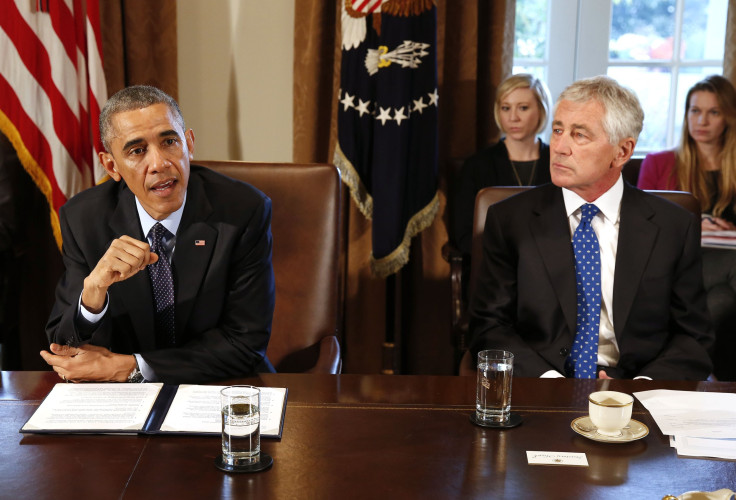Hagel's Departure Leaves Syrian Moderate Opposition With Uncertain Future

Rebels fighting for the Syrian opposition in the north of the country have lost both domestic and international support in recent weeks as several well-known battalions lost key battles to extremist groups and dozens of rebel soldiers defected. The U.S. now has a strict “ISIS first” strategy. The moderate opposition, which for more than three years has tried to topple President Bashar Assad with U.S. support, finds itself without any footing in Washington, especially after the resignation of Secretary of Defense Chuck Hagel.
Hagel announced his resignation Monday, raising questions about the future of the U.S. military presence in the Middle East. Hagel was a strong supporter of arming and training the moderate opposition in Syria and often pushed President Barack Obama to do more in Syria, senior officials close to the matter told the International Business Times. After Hagel leaves, the moderate opposition will lose one more staunch supporter.
Hagel, who took his post in February 2013, was at the forefront of forming the U.S.-led coalition to fight the Islamic State group, also known as ISIS or ISIL, but often pushed for a different strategy in Syria -- one that would remove Assad from power.
In an interview with CBS news last week, Hagel said the fight in Syria was a long-term challenge to fight ISIS militants, not to oust Assad.
“Is Assad being helped by what we are doing? He is indirectly benefitting,” Hagel said.
In recent weeks, the Obama administration has made it clear that it has an “ISIS first” strategy in both Syria and Iraq, trumping concerns about the fate of Assad. And on that point, sources on Capitol Hill told IBTimes, Hagel vehemently opposed and urged the administration to do more to oust the Syrian president, who has been accused of war crimes and crimes against humanity.
One source told the New York Times, which broke the story, that “the next couple of years will demand a different kind of focus.”
IBTimes reported last week that the Obama administration was considering taking a new approach in Syria by vetting a new group of moderate rebels in the south. That process has yet to begin, and in the meantime, the rebels are left to fend for themselves on two fronts -- Assad’s forces and Sunni Muslim extremist rebel groups like ISIS and Jabhat al-Nusra.
Hagel was one of the first senior officials to push the Obama administration to implement a train-and-equip mission for the Syrian rebels. In September, he pressed Congress to give the Defense Department the authority to begin such a mission, one separate from the CIA program that launched in 2012. Congress approved the new mission Sept. 19.
“While it will take time to strengthen the moderate Syrian opposition forces, they and the Iraqi security forces and Kurdish forces are central to confronting ISIL,” Hagel said in a statement Sept. 19. “The U.S. military will work closely with regional partners, including Saudi Arabia, to recruit and vet the opposition forces, and we will continue to build and sustain a broad coalition to implement our strategy.”
Even after the Syrian moderate opposition faced setbacks on the battlefield and infighting among its leaders, Hagel continued to advocate for the U.S. to send more resouces to the rebels. In December 2013, the moderate opposition was struggling to organize itself under Free Syrian Army commander Gen. Salim Idris and lost some of its weapons to extremist groups. Despite the setbacks and confusion, Hagel still supported the group.
"What has occurred here in the last couple of days is a clear reflection on how complicated and dangerous this situation is and how unpredictable it is," Hagel told a Pentagon press briefing in December 2013. "When the moderate opposition is set back, that's not good. But that's what we deal with. We take it straight up, work with the moderate opposition, with our allies in the area, and we'll continue to do that."
In a House foreign affairs subcommittee hearing last week, Robert S. Ford, a former Obama administration ambassador to Syria, endorsed the idea that the U.S. had not done enough to work with the moderate opposition.
The U.S.-led strategy of airstrikes against the Islamic State in Syria “has actually hurt the moderate opposition," he said. He said the American airstrikes in Syria hit elements of the al Qaeda-affiliated Jabhat al-Nusra in the northwestern part of the country, which caused them to retaliate against the moderate rebels, who were largely unprepared to deal with such attacks and fled.
"We didn't warn the moderate fighters about our strategy and what it could encompass, so they were surprised and unprepared for the air attacks and the Nusra Front response," said Ford. "We should have explained our strategy to Syrian rebels. If it continues like this, there isn’t going to be a moderate opposition in northern Syria."
Although Ford supported Hagel's view on the issue, he is no longer in a postition of influence in the administration. Now, the only official still pushing for the U.S. to do more to topple Assad and support the opposition is U.S. Ambassador to the United Nations Samantha Powers. Powers has repeatedly called on not only the Obama administration, but also the U.N. Security Council, to address the Syrian regime's crimes .
© Copyright IBTimes 2024. All rights reserved.




















